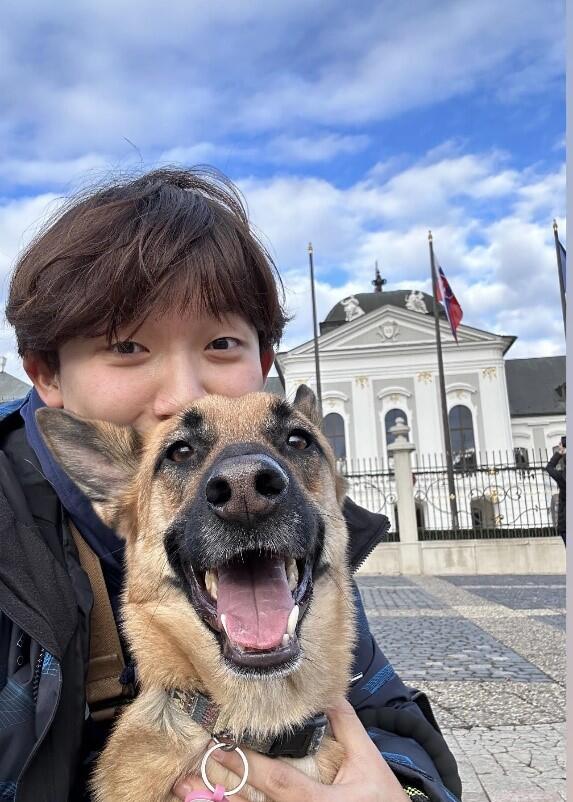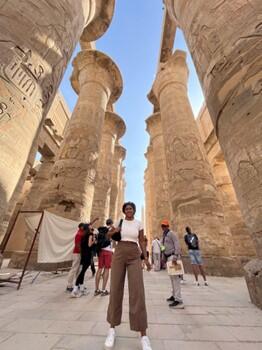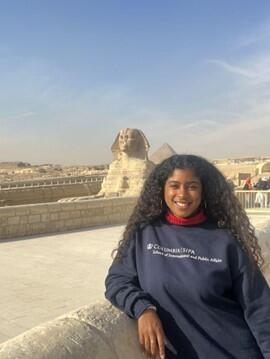
Study Abroad at SIPA: Experiences from Berlin and Cairo

SIPA lets you pursue dual-degree programs with other graduate schools at Columbia and distinguished partner institutions around the world through the Global Public Policy Network (GPPN). It provides students the opportunity to pursue two degrees, at two different Universities on two continents in two years, giving students the opportunity for a truly global perspective. It is currently offered at six institutions and a complete overview of the program can be found here. SIPA also allows second year students to spend a semester at one of our partner schools in Cairo or Mexico City.
Meet Joshua Hyochan Lee and Nykarlis Santos Nunez, both currently in their 2nd year. Nykarlis recently came back from a semester abroad in Egypt and Joshua is finishing up his dual degree in Berlin with our partner, Hertie School.
Could you tell us about your background and what you were studying at SIPA?
My name is Joshua Hyochan Lee, and I am a first-generation Korean American. I was born in Seoul, South Korea, but raised in Queens, New York. I completed my Bachelor of Arts in Political Science and Communication at Baruch College, also in New York, with a full-ride scholarship. Throughout my academic and professional journey, I gained diverse experiences working in legal, marketing, and data analytics roles. In my first year of graduate studies, I pursued a Master of International Affairs degree with a concentration in Economic and Political Development, specializing in Data Analytics and Quantitative Analysis at Columbia SIPA.
My name is Nykarlis Santos Nunez and I am Dominican American. Born and raised in Puerto Plata, Dominican Republic until age 12 then raised in Lawrenceburg, Indiana, USA for the remainder of my life. At SIPA I study Social Policy with a specialization in the African Region.

Joshua, what is your dual degree program and what led you to apply?
My international dual degree program is Master of International Affairs (MIA) from Columbia SIPA in New York & Master of Public Policy (MPP) from Hertie School of Governance in Berlin. I was inspired to apply to the SIPA/Hertie dual degree for three reasons: finance, experience, and opportunity.
(Finance) By participating, I learned that I would be paying the partner school's tuition for my second year. Hence, I knew I would save a lot of money and also earn two diplomas.
(Experience) Frankly, I will admit that initially, I did hesitate about committing to the dual degree program for fear that I would be missing out on a lot. But I was convinced that at the end of the day, it is really what you make of the experience. Another significant factor in terms of experience was the location. I felt that by participating, I would not only gain two networks (Columbia/Hertie) but also learn a lot by being in the EU.
(Opportunity) I have always wanted to study abroad, but never really had a chance to before. So, I thought about when I would ever get a chance to study abroad in Europe for a year again. It was an easy decision. On a side note, for folks still on the fence about whether to commit or not, feel free to reach out to me.
How about you Nykarlis, where was your study abroad and what led you to apply?
I studied abroad in Cairo, Egypt. Travel is the love of my life. Growing up in a low-income family in a developing country meant we never had opportunities to travel. So once I could travel on my own, I did so. I started by studying abroad in France with a scholarship and haven’t stopped since then. I was 21 then and now at 27, I had visited 45 countries in 4.5 years by myself, and I had been to every continent in the world except for Antarctica. Yet, I still had not been to the Middle East Region and that part of the world was always so interesting to me. I also wanted to start learning Arabic as my 5th language and this exchange was the perfect opportunity.

What did a typical day look like for you?
Well, I was lucky to get a one-bedroom apartment near campus. It was only a 10 min walk, which was great because in September the heat was hitting double digits. I walked to school everyday. The week started on Sunday, not Monday. The campus was heavily secured with security at the main entrance and then once you entered the inner campus. The campus was beautiful: gardens with colorful flowers, glamorous water fountains, palm trees everywhere, Egyptian architecture. I was learning two types of Arabic, Egyptian Colloquial and Modern Standard. I also took a Middle East Studies class and an Infrastructure class. After class, I went to the free boxing or yoga classes at the school gym and hung out with local and international friends in places like Maadi, Zamalek and downtown. The day mostly ended with eating some type of Middle Eastern cuisine, often Egyptian, Syrian and Lebanese food.
As for you Joshua, how has your experience been thus far?
My experience thus far has been amazing! As mentioned earlier, I believe it's all about what you make of the experience. So, I made sure to fully take advantage of my time here. Apart from fulfilling my academic responsibilities, I dedicated time to exploring, learning German, immersing myself in the culture, and networking with other bright minds. Personally, I thoroughly enjoy traveling. Since August, I have visited over 27 different cities and 15 countries in Europe.
How do you think this experience complements your experience at SIPA?
Looking back, it would be inaccurate to say that Hertie merely complimented my experience at SIPA. In reality, it elevated my master's experience by several folds. That's not to diminish my appreciation for SIPA; I truly cherished my time there. The environment, the classes, the peers, networking opportunities, and events—all contributed significantly to my growth. I gained invaluable insights into international affairs and discovered many new perspectives.
However, pursuing a dual degree opened doors to even more learning and experiences than I had anticipated. Immersing myself in a new country, continent, and environment was transformative. Choosing this path not only means earning an additional degree but also gaining so much more. As I've mentioned before, the value of the opportunity depends on what you make of it.
I previously mentioned traveling to over 27 different cities. While my passion for exploration played a role, I believe it enriched my understanding of history, context, culture, and politics far beyond what I could have learned in the classrooms alone. Ironically, pursuing an MPP degree, these experiences at Hertie and in Europe have deepened my understanding and added vibrancy to my studies in international affairs.

What about you Nykarlis, how do you think your study abroad experience complemented your studies at SIPA?
This was such an enriching academic and cultural experience for me. Taking the infrastructure for sustainable development class opened my eyes to how this social issue is addressed in African and Middle Eastern countries. Additionally, I learned so much about the region both politically and culturally in my Middle Eastern Studies class. This course helped me understand the US’s impact in the region and also the politics of the region. When I accepted to come to SIPA instead of John Hopkins, the ability to study abroad for part of my masters was one of the things that attracted me the most. Being able to accomplish that goal and have learned so much made coming to SIPA worth the experience. Also, starting my Arabic learning journey so I can potentially work in the region in the future is significant to me.
How was your course load and is there any specific class you enjoyed?
Graduate classes only met once per week but they were quite late into the evening due to most graduate students there having full-time jobs. So, think 5pm,7pm classes and some ended at 10pm. The course load was a bit heavy compared to SIPA. There were weekly essays, and in one class I had to present 5 times. However, I really enjoyed all of my classes. I learned a lot about the region and about infrastructure for sustainable development. My Arabic classes were my favorite though. The professors were so kind and generous. They not only taught us the languages but also the culture and that helped a lot while living there. I enjoyed learning Egyptian Arabic more than the modern standard Arabic, which is more formal.

Joshua, how does this degree differ from the MIA/MPA at SIPA, how was the student body, and what are the main differences between SIPA and Hertie School?
Besides the core courses and thesis requirements, the MPP degree doesn't differ too much from the MIA/MPA at SIPA. One regret I have is not completing the capstone in my first year (for exiting dual degrees, the capstone is not required). Therefore, for anyone considering the dual degree, I highly recommend attempting to fulfill the capstone requirement in your first year. According to the Hertie website, there are "801 students from over 70 countries," in the student body. Some of the main noticeable differences would be the cost of living, tuition, campus size, and lastly, capstone/thesis requirements.
Nykarlis, how was the student body and what were the main differences you noticed between SIPA and the American University of Cairo?
The student body was mostly Egyptian, with some students from the surrounding countries. However, there were a good number of international students. We had a WhatsApp group chat of about 400 international students. Local students were very high class though and you could tell by the way they dressed and behaved, especially the undergraduates, which made up the majority of the student body. From my experience, I would say SIPA is more organized when it comes to the administration. This might be culture though as Egyptians like to take their time with things and punctuality is not as important there. AUC did have more free resources for students such as the fitness classes, therapy, and even organized many national travel trips at an affordable cost. The health insurance fee was significantly more affordable at AUC as well. There were also a lot of places to grab food and coffee on campus at AUC and there was high campus security.
For the both of you, would you recommend a dual degree/ study abroad as part of a graduate program? Why or why not?
Joshua: In case my passion and love for my dual degree program weren't already evident, I highly recommend it. This is especially true if you're interested in working in or focusing on a specific region internationally, or if you don't have much study or work abroad experience. The opportunities and experiences it offers are invaluable for personal and professional growth.
Nykarlis: Absolutely. For most people at SIPA studying in New York is already a study abroad experience as the majority of our student body is international. And based on my friends' experiences here in NYC they seem to love it. As an American, studying abroad in Egypt was so stimulating, and I am so happy I got the chance to do so. If I had the opportunity to redo it, I would. I loved my time in Egypt and frankly was not ready for it to end. You learn so much studying abroad, not only about the course you are taking but about humankind, the world and yourself. Studying abroad is accelerated learning and you meet people that challenge your perspective and make you a better person.
Anything else you would like to share?
Nykarlis: As an Afro-Latina, Egyptians reminded me very much of both of my communities, the Latinx and the Black community. They are joyous and generous people who love to be social, make a lot of jokes, and help strangers like me. Everyone treated me with respect and a lot of love, even when I could not speak their language. I really appreciated that. Lastly, I got to travel a lot domestically in Egypt and as someone who travels a lot, I tell you it is really a country to see. From mountains, to different kinds of breath-taking desserts, and some of the world's best scuba diving in the Red Sea, let alone all the history, Egypt is a must see.
Joshua: I received a lot of help and support from previous alumni, and I would love to pay it forward by being there for anyone considering dual degree programs. If you have any questions, please feel free to reach out to me via email at [email protected].